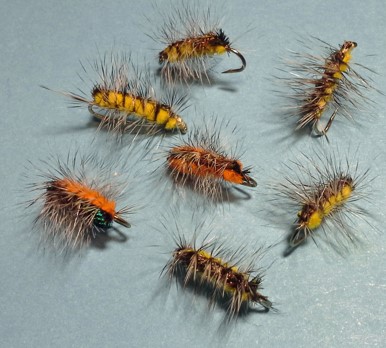If you’re after a nymph with strong movement and contrast, Fed’s Orange Bead Head Soft Hackle is a great choice. It combines classic materials with a bright fluoro bead, offering several triggers that appeal to fish feeding subsurface.
This pattern performs well in both fast and slow water. It works best when fish are keyed in on small aquatic insects. The orange bead helps in murky or tannin-stained conditions by adding visibility and flash.
Tying Notes
The orange bead acts as a hotspot — a proven trigger for trout and other freshwater species. The variegated chenille makes a buggy, segmented body. The silver wire adds durability and a hint of flash.
The tail uses Voodoo Fibres for subtle movement without bulking out the fly. The soft mallee fowl hackle brings life to the pattern, especially when drifting or swinging in current.
This pattern suits modern nymphing styles but also works as a traditional wet or attractor fly. You can dead-drift it, fish it on the swing, or pair it with a dropper in a two-fly rig.
Fishing Tips
- Try fishing this fly as the point fly in a two-nymph rig.
- Great as a lead fly in dirty water or low-light conditions.
- Pairs well with a smaller natural trailing fly like a pheasant tail or midge pupa.
- The bead makes it ideal for moderate depth runs or faster pocket water.
Fed’s pattern proves that a few well-chosen materials, used well, can create a highly effective fly. It’s easy to tie, easy to fish — and hard for trout to ignore.
Materials
- Hook:Size 14.
- Bead:5/64 orange fluoro.
- Thread:Black sheer 14/0.
- Tail:Micro Olive Voodoo Fibres (six folds/12 strands).
- Body:Black/brown micro variegated chenille.
- Rib:Fine silver wire.
- Hackle:Mallee fowl.

Tying Instructions

- Slide on the Bead
Attach a length of fine silver wire along the near side of the hook, securing it down the shank. - Start the Thread
Secure the hook in your vise and cover the shank with a smooth base layer of black 14/0 thread.
- Tie in the Rib
Attach a length of fine silver wire along the near side of the hook, securing it down the shank.
Note: Paul ties on the micro olive Voodoo Fibres first in the video.


- Add the Tail
Select six folds (approximately 12 strands) of micro olive Voodoo Fibres and tie them in to form a short, sparse tail.
- Form the Body
Tie in the black/brown micro variegated chenille. Wrap forward to build a full, slightly chubby body, then secure and trim the excess.


- Rib the Body
Counter-wrap the silver wire forward in evenly spaced turns to create segmentation and add durability. Tie off and break or trim the wire.
- Prepare and Tie the Hackle
Select a mallee fowl feather and strip the fluff from the base. Tie it in by the tips just in front of the body, then wrap 1–2 turns to form a soft hackle collar. Secure and trim the stem.


- Finish the Fly
Build a small thread head, whip finish, and cut the thread.
- Set the Hackle
Gently train the hackle fibres rearward using a low-heat hair dryer or by pinching and rolling them between your fingers.






